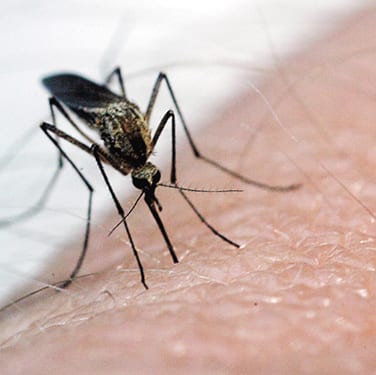People with HIV/AIDS are at greater risk of developing severe complications from West Nile Virus, which has led to 10 deaths in Dallas County this summer. But people with HIV/AIDS could also face greater risk from exposure to the chemicals used in aerial spraying to combat the virus.
“The same people they’re trying to protect are the same people who are sensitive to the chemicals being dropped,” said Bret Camp, health services director for Resource Center Dallas.
One open letter signed by 26 doctors and other experts in 2001 said the chemical agents used in aerial spraying contain neurotoxins and can be dangerous to the treated area. The letter, distributed by groups opposed to mosquito spraying in New York City, specifically listed “immunosuppressed individuals, such as patients with AIDS and cancer,” among those who may be especially vulnerable.
“INDISCRIMINATE AND UNNECESSARY SPRAYING OF ‘FRIENDLY FIRE’ PESTICIDES, ESPECIALLY IN HEAVILY POPULATED URBAN AREAS, IS FAR MORE DANGEROUS TO HUMAN HEALTH AND THE NATURAL ENVIRONMENT THAN WEST NILE VIRUS,” the letter states. “THE HEALTH OF MANY PEOPLE IS DETERIORATING AND WILL FURTHER DETERIORATE, SOMETIMES SERIOUSLY, AS A RESULT OF EXPOSURE TO ‘FRIENDLY FIRE PESTICIDES’ USED IN THE CHEMICAL WAR AGAINST MOSQUITOES. THOSE WHO ARE ESPECIALLY VULNERABLE INCLUDE CHILDREN, THE OFFSPRING OF PREGNANT WOMEN, CHEMICALLY SENSITIVE OR IMMUNO-SUPPRESSED INDIVIDUALS, SUCH AS PATIENTS WITH AIDS AND CANCER, AND THOSE SUFFERING WITH ASTHMA AND OTHER ALLERGIES.”
RCD’s Camp acknowledged it’s a controversial issue, but he said he believes the benefits of aerial spraying ultimately outweigh the risks — and that it’s worth it to try to keep the community safe.
There have now been 128 known human cases of West Nile in Dallas County alone. The numbers are dramatically increasing every day, with 380 human cases in Texas, making the state home to what is by far the worst outbreak on record in the country. The situation has become so dire that Dallas Mayor Mike Rawlings declared a state of disaster for the city on Wednesday.
Dallas, along with other surrounding cities, have approved the use of aerial spraying as a last resort to combat the outbreak. Dallas has not conducted aerial spraying since 1966.
According to the Dallas Morning News the Environmental Protection Agency and the Centers for Disease Control and Prevention say there is no “unreasonable risk” and this is a necessary procedure to protect the health of the citizens.
The city of Dallas has compiled a list of precautions and preventative measures for the impending aerial spraying, which could begin as early as Thursday night. Among the the city’s suggested precautions:
• Minimize exposure. Avoid being outside, close windows and consider keeping pets inside while spraying occurs.
• If skin or clothes are exposed, wash them with soap and water.
• Rinse homegrown fruits and vegetables with water as a general precautionary measure.
• Cover small ornamental fish ponds.
• Because the chemical breaks down quickly in sunlight and water, no special precautions are suggested for outdoor swimming areas.
UPDATE: Oak Lawn is included in the area that’s scheduled for aerial spraying beginning at 8:30 p.m. Thursday night and lasting for two hours.

















